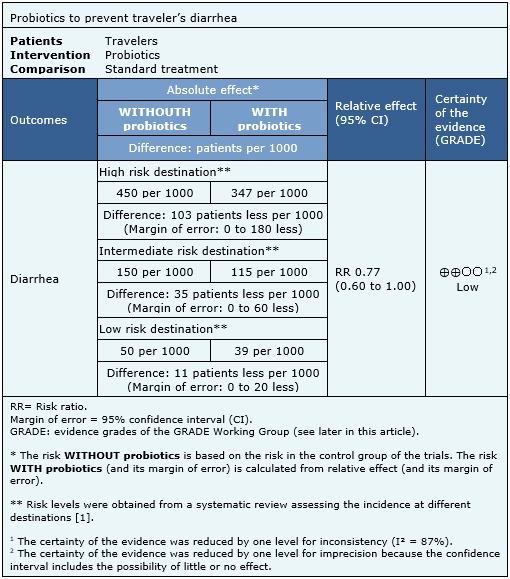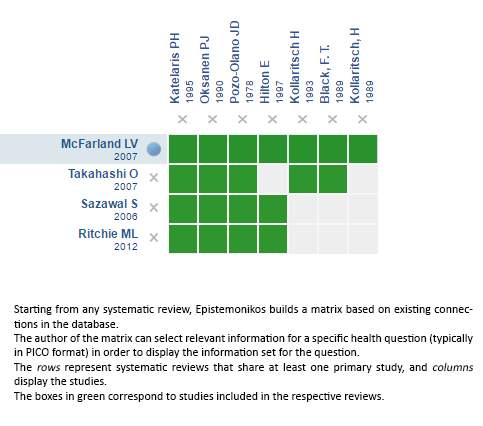 Para Descargar PDF debe Abrir sesión.
Para Descargar PDF debe Abrir sesión.
La diarrea aguda es la enfermedad más común que afecta a los viajeros, principalmente aquellos que se dirigen a regiones de alto riesgo. El uso de probióticos podría prevenir su aparición, sin embargo, los datos que apoyan su uso no son consistentes y no se recomiendan en las guías clínicas actuales. Utilizando la base de datos Epistemonikos, la cual es mantenida mediante búsquedas en múltiples bases de datos, identificamos cuatro revisiones sistemáticas que en conjunto incluyen siete estudios aleatorizados pertinentes a esta pregunta. Realizamos un metanálisis y tablas de resumen de los resultados utilizando el método GRADE. Concluimos que los probióticos podrían prevenir la diarrea del viajero, pero la certeza de la evidencia es baja.
Acute diarrhea is the most common disease that affects travelers heading to at-risk areas. Although preventive measures related to hygiene have reduced the risk in many destinations, this is still high in some others [1].
The use of probiotics as prophylaxis for traveler's diarrhea seems attractive because of their beneficial effects over intestinal flora, and the reduction in colonization by pathogenic bacteria, in addition to their safety. However, data supporting their use are not consistent [2].
We used Epistemonikos database, which is maintained by screening multiple databases, to identify systematic reviews and their included primary studies. With this information, we generated a structured summary using a pre-established format, which includes key messages, a summary of the body of evidence (presented as an evidence matrix in Epistemonikos), meta-analysis of the total of studies, a summary of findings table following the GRADE approach and a table of other considerations for decision-making.
|
Key messages
|
|
What is the evidence. |
We found four systematic reviews [3],[4],[5],[6], that included seven randomized controlled trials [7],[8],[9],[10],[11],[12],[13]. |
|
What types of patients were included |
Three studies only included adults [7],[11],[13]. One study included patients aged 10 to 80 years [10]. In three studies, the age range was not specified [8],[9],[12]. The included patients traveled to different destinations: |
|
What types of interventions were included |
The trials used different probiotics and in different doses:
All of the trials compared against placebo or standard treatment. |
|
What types of outcomes |
The outcome was the development of diarrhea during the trip, defined as more than three stools per day for at least two days, or more than five stools in 48 hours. |
Both trials evaluated the use of tetrahydrocannabinol capsules administered orally. In one trial, the dose was 5 mg, 7.5 mg or 10 mg once [9], and in the other trials, the dose was not specified [8].
The information on the effects of probiotics to prevent traveler's diarrhea is based on seven randomized trials including 4,025 patients. All of the trials measured the outcome of diarrhea during the trip, defined as more than three stools per day for at least two days or more than five stools in 48 hours.
The summary of findings is as follows:

|
Follow the link to access the interactive version of the Summary of Findings (iSoF) table |

|
To whom this evidence does and does not apply |
|
| About the outcomes included in this summary |
|
| Balance between benefits and risks, and certainty of the evidence |
|
| What would patients and their doctors think about this intervention |
|
| Resource considerations |
|
|
Differences between this summary and other sources |
|
| Could this evidence change in the future? |
|
Using automated and collaborative means, we compiled all the relevant evidence for the question of interest and we present it as a matrix of evidence.

Follow the link to access the interactive version: Probiotics for prevention of traveler's diarrhea
The upper portion of the matrix of evidence will display a warning of “new evidence” if new systematic reviews are published after the publication of this summary. Even though the project considers the periodical update of these summaries, users are invited to comment in Medwave or to contact the authors through email if they find new evidence and the summary should be updated earlier. After creating an account in Epistemonikos, users will be able to save the matrixes and to receive automated notifications any time new evidence potentially relevant for the question appears.
The details about the methods used to produce these summaries are described here http://dx.doi.org/10.5867/medwave.2014.06.5997.
Epistemonikos foundation is a non-for-profit organization aiming to bring information closer to health decision-makers with technology. Its main development is Epistemonikos database (www.epistemonikos.org).
These summaries follow a rigorous process of internal peer review.
Conflicts of interest
The authors do not have relevant interests to declare.
 Esta obra de Medwave está bajo una licencia Creative Commons Atribución-NoComercial 3.0 Unported. Esta licencia permite el uso, distribución y reproducción del artículo en cualquier medio, siempre y cuando se otorgue el crédito correspondiente al autor del artículo y al medio en que se publica, en este caso, Medwave.
Esta obra de Medwave está bajo una licencia Creative Commons Atribución-NoComercial 3.0 Unported. Esta licencia permite el uso, distribución y reproducción del artículo en cualquier medio, siempre y cuando se otorgue el crédito correspondiente al autor del artículo y al medio en que se publica, en este caso, Medwave.

La diarrea aguda es la enfermedad más común que afecta a los viajeros, principalmente aquellos que se dirigen a regiones de alto riesgo. El uso de probióticos podría prevenir su aparición, sin embargo, los datos que apoyan su uso no son consistentes y no se recomiendan en las guías clínicas actuales. Utilizando la base de datos Epistemonikos, la cual es mantenida mediante búsquedas en múltiples bases de datos, identificamos cuatro revisiones sistemáticas que en conjunto incluyen siete estudios aleatorizados pertinentes a esta pregunta. Realizamos un metanálisis y tablas de resumen de los resultados utilizando el método GRADE. Concluimos que los probióticos podrían prevenir la diarrea del viajero, pero la certeza de la evidencia es baja.
 Autores:
Yazmín Pinos[1,2], Victoria Castro-Gutiérrez[2,3], Gabriel Rada[1,2,4,5,6]
Autores:
Yazmín Pinos[1,2], Victoria Castro-Gutiérrez[2,3], Gabriel Rada[1,2,4,5,6]

Citación: Pinos Y, Castro-Gutiérrez V, Rada G. Are probiotics effective to prevent traveler’s diarrhea?. Medwave 2016; 16(Suppl5):e6807 doi: 10.5867/medwave.2016.6807
Fecha de publicación: 23/12/2016

Nos complace que usted tenga interés en comentar uno de nuestros artículos. Su comentario será publicado inmediatamente. No obstante, Medwave se reserva el derecho a eliminarlo posteriormente si la dirección editorial considera que su comentario es: ofensivo en algún sentido, irrelevante, trivial, contiene errores de lenguaje, contiene arengas políticas, obedece a fines comerciales, contiene datos de alguna persona en particular, o sugiere cambios en el manejo de pacientes que no hayan sido publicados previamente en alguna revista con revisión por pares.
Aún no hay comentarios en este artículo.
Para comentar debe iniciar sesión
 Medwave publica las vistas HTML y descargas PDF por artículo, junto con otras métricas de redes sociales.
Medwave publica las vistas HTML y descargas PDF por artículo, junto con otras métricas de redes sociales.
 Steffen R, Hill DR, DuPont HL. Traveler's diarrhea: a clinical review. JAMA. 2015 Jan 6;313(1):71-80. | CrossRef | PubMed |
Steffen R, Hill DR, DuPont HL. Traveler's diarrhea: a clinical review. JAMA. 2015 Jan 6;313(1):71-80. | CrossRef | PubMed | Riddle MS, DuPont HL, Connor BA. ACG Clinical Guideline: Diagnosis, Treatment, and Prevention of Acute Diarrheal Infections in Adults. Am J Gastroenterol. 2016 May;111(5):602-22 | CrossRef | PubMed |
Riddle MS, DuPont HL, Connor BA. ACG Clinical Guideline: Diagnosis, Treatment, and Prevention of Acute Diarrheal Infections in Adults. Am J Gastroenterol. 2016 May;111(5):602-22 | CrossRef | PubMed | Sazawal S, Hiremath G, Dhingra U, Malik P, Deb S, Black RE. Efficacy of probiotics in prevention of acute diarrhoea: a meta-analysis of masked, randomised, placebo-controlled trials. Lancet Infect Dis. 2006 Jun;6(6):374-82 | PubMed |
Sazawal S, Hiremath G, Dhingra U, Malik P, Deb S, Black RE. Efficacy of probiotics in prevention of acute diarrhoea: a meta-analysis of masked, randomised, placebo-controlled trials. Lancet Infect Dis. 2006 Jun;6(6):374-82 | PubMed | Ritchie ML, Romanuk TN. A meta-analysis of probiotic efficacy for gastrointestinal diseases. PLoS One. 2012;7(4):e34938 | CrossRef | PubMed |
Ritchie ML, Romanuk TN. A meta-analysis of probiotic efficacy for gastrointestinal diseases. PLoS One. 2012;7(4):e34938 | CrossRef | PubMed | McFarland LV. Meta-analysis of probiotics for the prevention of traveler's diarrhea. Travel Med Infect Dis. 2007 Mar;5(2):97-105 | PubMed |
McFarland LV. Meta-analysis of probiotics for the prevention of traveler's diarrhea. Travel Med Infect Dis. 2007 Mar;5(2):97-105 | PubMed | Takahashi O, Noguchi Y, Omata F, Tokuda Y, Fukui T. Probiotics in the prevention of traveler's diarrhea: meta-analysis. J Clin Gastroenterol. 2007 Mar;41(3):336-7 | PubMed |
Takahashi O, Noguchi Y, Omata F, Tokuda Y, Fukui T. Probiotics in the prevention of traveler's diarrhea: meta-analysis. J Clin Gastroenterol. 2007 Mar;41(3):336-7 | PubMed | Katelaris PH, Salam I, Farthing MJ. Lactobacilli to prevent traveler's diarrhea? N Engl J Med. 1995 Nov 16;333(20):1360-1 | PubMed |
Katelaris PH, Salam I, Farthing MJ. Lactobacilli to prevent traveler's diarrhea? N Engl J Med. 1995 Nov 16;333(20):1360-1 | PubMed | Kollaritsch H, Holst H, Grobara P, Wiedermann G. [Prevention of traveler's diarrhea with Saccharomyces boulardii. Results of a placebo controlled double-blind study]. Fortschr Med. 1993 Mar 30;111(9):152-6. | PubMed |
Kollaritsch H, Holst H, Grobara P, Wiedermann G. [Prevention of traveler's diarrhea with Saccharomyces boulardii. Results of a placebo controlled double-blind study]. Fortschr Med. 1993 Mar 30;111(9):152-6. | PubMed | Black FT, Andersen PL, Ørskov J, Ørskov F, Gaarslev K, Laulund S, Steffen Robert, Lobel Hans, Haworth James, Bradley David J. Prophylactic Efficacy of Lactobacilli on Traveler’s Diarrhea. Travel Medicine. 1989;:333-335 | CrossRef | Link |
Black FT, Andersen PL, Ørskov J, Ørskov F, Gaarslev K, Laulund S, Steffen Robert, Lobel Hans, Haworth James, Bradley David J. Prophylactic Efficacy of Lactobacilli on Traveler’s Diarrhea. Travel Medicine. 1989;:333-335 | CrossRef | Link | : Oksanen PJ, Salminen S, Saxelin M, Hämäläinen P, Ihantola-Vormisto A, Muurasniemi-Isoviita L, Nikkari S, Oksanen T, Pörsti I, Salminen E, et al. Prevention of travellers' diarrhoea by Lactobacillus GG. Ann Med. 1990 Feb;22(1):53-6 | PubMed |
: Oksanen PJ, Salminen S, Saxelin M, Hämäläinen P, Ihantola-Vormisto A, Muurasniemi-Isoviita L, Nikkari S, Oksanen T, Pörsti I, Salminen E, et al. Prevention of travellers' diarrhoea by Lactobacillus GG. Ann Med. 1990 Feb;22(1):53-6 | PubMed | Hilton E, Kolakowski P, Singer C, Smith M. Efficacy of Lactobacillus GG as a Diarrheal Preventive in Travelers. J Travel Med. 1997 Mar 1;4(1):41-43 | PubMed |
Hilton E, Kolakowski P, Singer C, Smith M. Efficacy of Lactobacillus GG as a Diarrheal Preventive in Travelers. J Travel Med. 1997 Mar 1;4(1):41-43 | PubMed | Kollaritsch, H, Kremsner, PETER, Wiedermann, GERHARD, Scheiner, OTTO. Prevention of traveller’s diarrhea: comparison of different non-antibiotic preparations. Travel Med Int. 1989;11:9-17 | Link |
Kollaritsch, H, Kremsner, PETER, Wiedermann, GERHARD, Scheiner, OTTO. Prevention of traveller’s diarrhea: comparison of different non-antibiotic preparations. Travel Med Int. 1989;11:9-17 | Link | de dios Pozo-Olano J, Warram JH Jr, Gómez RG, Cavazos MG. Effect of a lactobacilli preparation on traveler's diarrhea. A randomized, double blind clinical trial. Gastroenterology. 1978 May;74(5 Pt 1):829-30 | PubMed |
de dios Pozo-Olano J, Warram JH Jr, Gómez RG, Cavazos MG. Effect of a lactobacilli preparation on traveler's diarrhea. A randomized, double blind clinical trial. Gastroenterology. 1978 May;74(5 Pt 1):829-30 | PubMed |